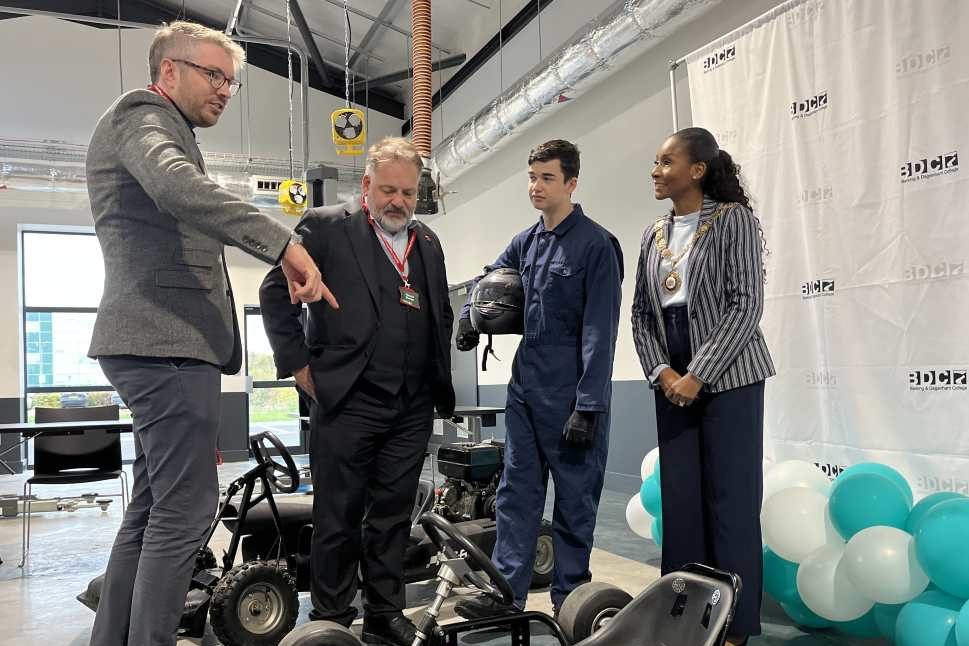Young people’s verdict of apprenticeships as “career building” increases by circa 70%

Largest-ever research into apprentice experience reveals seven building blocks companies need for quality apprenticeship programmes.
The number of UK apprentices viewing their apprenticeships as a genuine career path has increased by almost 70% according to the most comprehensive research ever done into the apprenticeship experience.
An analysis of post-apprenticeship data captured over five years from more than 15,000 apprentices reveals how more of them are recommending the route as a career path while fewer see it as merely an “interesting” activity.
And apprentices willing to recommend their apprenticeship employer to a friend has averaged 98% in the past five years.
The data* – captured by specialist review site RateMyApprenticeship and analysed by Crescendo Consulting – shows a two-thirds increase over five years in those citing apprenticeships as a valid career path.
Conversely, those recommending the option to a friend because it’s “interesting” has fallen by more than a quarter from 37% of apprentices in 2013 to 26% in 2018. The research also shows a drop of more than a fifth (from 22% in 2013 to 18% in 2018) of apprentices recommending their apprenticeship as just another way of getting to university.
The decline in apprentices doing “admin” tasks and focusing on more meaningful work revealed in the research suggests companies are now reframing apprenticeships as a more credible, future talent pipeline.
Oliver Sidwell, co-founder and director, RMP Enterprise – early talent attraction experts and owners of RateMyApprenticeship – said:
“Apprentices are increasingly treating their experience as planning for the road ahead and acknowledging it as a worthwhile career choice in its own right.
“The growth in this sentiment among apprentices is a strong indication to employers that apprenticeships are a valuable investment for attracting the best talent. This is happening at a time when university applications have fallen by three percent and are at the lowest level since 2009**.”
RMP Enterprise’s research, based on 10 questions apprentices answer about their apprenticeship programme, has also highlighted the seven vital elements the best companies are adopting to create successful apprenticeship programmes:
- Inspiring leadership
- Management is the most important factor for making apprentices feel valued.
- More than a third (37%) of apprenticeship reviews in 2018 point to the benefit of management appreciation – an increase from 30% five years ago.
- Companies’ senior leadership are recognising this effect as 42% of all apprentices who responded acknowledge them as a source of support.
- Support from companies’ HR professionals – at just 13% – appears less visible to apprentices.
Oliver Sidwell: “Young people are inspired by leaders, not autocratic management. Senior managers who act as coaches can motivate and show direction to help their apprentices develop skills. It’s possible that HR professional step back after induction but the overall apprenticeship could benefit from more regular dialogue between personnel professionals and apprentices.”
- Building skills for work and life
- More apprentices in the best companies are developing a range of valuable career skills rather than performing lower-skilled tasks. Only 7% mention “admin” as a daily activity – the lowest figure since the research began.
- Apprentices are now developing a blend of soft and technical skills including:
- Communication – at 26% the most prominent.
- Software and programming – 14%
- Confidence building – 9%
- Excel – 9%
- Working with customers – 6%
- Team building – 5%
- Managing projects – 5%
- But apprentices also appear to think that certain skills development is being neglected:
- Technical knowledge – only 3%
- Problem solving – 2%
- Creating and relationship building – less than 2%
- Building confidence as a skill has shown a slight decline in the past three years.
Oliver Sidwell: “Apprentices have indicated how learning plays a more and more significant part in their apprenticeship programmes (an increase of more than a quarter over five years – from 23% of apprentices to 29%). However, employers should be wary of ignoring the importance of developing confidence in their young employees who are new to the world of full-time work.”
- Valuable experience versus having fun
While apprentices are enjoying certain elements of their programme – such as being part of a workplace team (33%), learning (28%) and gaining experience (27%) – they are finding comparatively less fun in other activities, such as working with customers (5%), having responsibility (4%) and software and programming (1%).
Sidwell commented: “To address the gap between the fun of an apprenticeship and the long-term value it offers to both apprentice and employer, companies need to explain the growth and development opportunities presented across all of the tasks involved day to day. They also need to ask apprentices what aspects of their day-to-day work they’re not enjoying and why; simultaneously, they need to ensure apprentices understand the importance of learning to work with the company’s customers and accepting the increased pressure of taking responsibility in their role.”
- Creating passionate people
Apprentices – when giving advice to others based on their apprenticeship experience – put thorough preparation first (21%), but follow it closely by “show passion” (19%) and “be confident” (17%).
Oliver Sidwell: “To engender this level of passion and confidence in apprentices, companies can help them connect their everyday activities with the overall mission of the organisation. Understanding the underlying vision and values of the company will help develop that passion and lead apprentices to become ambassadors for the company, encouraging others to want to work there too.”
- Cushioning the cost
When asked whether the apprenticeship salary/package met their costs, more than a third (38%) of apprentices find travel costs challenging. Other salary-related issues include:
- Having to live at home – 16%
- Paying for accommodation – 13%
- Affording to socialise – 11%
- Paying for food/meals – 11%
- Struggling financially – 6%
- Paying bills is a challenge – 5%
Oliver Sidwell: “Though apprenticeships allow ‘earning while learning’ and gaining experience, their pay can often be pinned to the National Minimum Wage. To make an apprenticeship programme more viable for the apprentice and to attract the best talent, companies need to think longer term and pay their apprentices enough to minimise financial pressures – and if they do, this research suggests they’ll get more out of the apprentice too. ”
- Going beyond the day-to-day
What makes this generation of young people tick is vital for employers to get the most from their apprenticeship programmes: while opportunities to engage in activities outside work show that sports and socialising (mentioned by 28% of all apprentices who responded) still dominate, interest in the latter has declined from 33% to 26% of all apprentices over five years. Meanwhile, interest in volunteering has increased by more than 80% (from 9% of apprentices in 2013 to 17%) in the same period.
Oliver Sidwell: “Companies need to recognise that apprentices in Generation Z see themselves as global citizens, wanting to make a difference to society and the world around them. This is reflected in the significant shift shown by our research where the value of helping others is growing while traditional workplace leisure pursuits are in decline.”
- Having someone by your side
Using workplace mentors to support apprentices is at its highest level in five years. However, over the whole research period only 14% of apprentices felt the mentoring aspect of their programmes was well-managed, behind training (50%) and induction (31%). Apprentices have also highlighted a steady decline in support from their training providers during the research period.
Oliver Sidwell: “It is encouraging to see that mentoring in apprenticeships is on the increase as young people are more likely to trust their peers and ask questions that may be embarrassing to ask more senior management. However, mentors remain an undervalued component of a successful apprenticeship and companies could allocate more of their resources to this element.
“It’s also important that companies view apprenticeships as a partnership with a training provider. This means selecting the right provider to deliver a consistent experience for the apprentice and value for the company.”
To coincide with the research, RateMyApprenticeship launches its fifth annual Top 100 Apprentice Employers league table today, showcasing the employers who offer the best apprenticeship programmes in the UK.
BAE Systems has been crowned the winner, based solely on reviews submitted by their apprentices on RateMyApprenticeship.co.uk between June 2017 and May 2018.
*The research findings are based on an analysis of comments and ratings provided by 15,000 apprentices completing apprenticeship programmes across the UK between 2013 and 2018 on RateMyApprenticeship.
**Deadline Applicant Statistics: deadline Thursday 18 January 2018. UCAS Analysis and Research, published on Monday 5 February 2018 at www.ucas.com.
About RateMyApprenticeship.co.uk: Launched in 2013, RateMyApprenticeship.co.uk provides 14-18 year olds with relevant and engaging peer-to-peer information about their career options when they leave school or college. It features over 15,000 reviews from apprentices and advertises apprenticeship opportunities from some of the biggest companies in the UK. It has a huge amount of advice for school leavers, parents and careers advisors and reveals the Top 100 Apprenticeship Employers to work for annually, based solely on the reviews.
About RMP Enterprise: Since 2007, RMP Enterprise has partnered with forward-thinking employers to support them in engaging and attracting the best early talent. The company’s mission is to inspire young people with the first steps in their career and has helped employers engage with millions of young people aged 14-24 through its extensive portfolio of face-to-face and digital products and services.
About Crescendo Consulting: Crescendo specialises in content analysis, using sophisticated text mining and semantic analysis to produce quantitative metrics from qualitative comments. It works with reviews, and other online content to help organisations understand which themes and issues are most prominent in unstructured data and uses robust statistical analysis to provide insight into current opinions and trends over time.











Responses